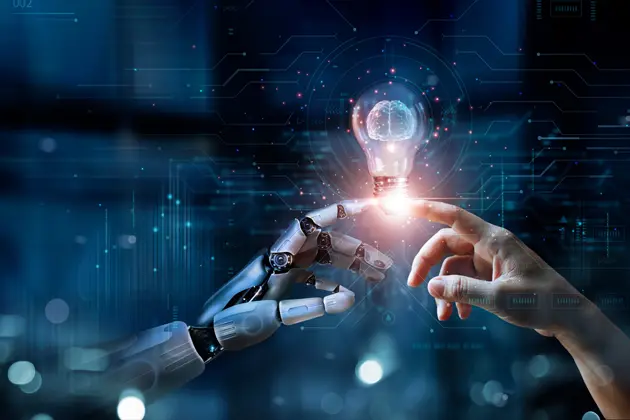The jaw-dropping power of Artificial Intelligence has emerged with prominence in the last few years with Generative AI. But this is not it. Just when we are settling down with generative AI, this breakthrough technology is ready again to surprise us with Agentic AI. Technology autonomy is moving forward at lightning speed, and Agentic AI is a burning example of this phenomenon. Let us see what Agentic AI is and how it is expected to transform the landscape of technology and business drastically.
What is Agentic AI?
A new combined offspring of state-of-the-art AI, Agentic AI is empowered to create several powerful autonomous agents to execute complex business operations. The components of this revolutionary technology are a coupling of varied AI models, techniques, and approaches that operate with minimal human intervention. Agentic AI turns the agents into problem-solving devices with near-human cognition achieved successfully. Machine learning, Large Language Modules, Reinforcement Learning, and Deep Learning are key AI techniques that contribute to the level of cognition in Agentic AI.
Power of Agentic AI
Agentic AI empowers machines to make decisions, solve issues, and take action. It has the potential to redefine technological interaction and revolutionize industries, creating an era of its own. Rising above traditional AI, this AI prototype is well-equipped with the chaining capability. It breaks down complex tasks into manageable phases through a sequence of actions against a single request. Agentic AI does not only answer your questions but also takes the initiative to solve complex problems and adapt to changing circumstances.
Agentic AI: The Next Big Thing?
For its ability to revolutionize technological interaction and problem-solving, Agentic AI is slowly becoming a go-to solution for all tech experts and business leaders. This multi-tasking technology has multiple features to best serve your purpose. Let us see why Agentic AI is the next big thing-
I. High Adaptability
Systems crafted with Agentic AI have high adaptability as they can adjust strategies depending on changing environments and information. It makes the systems extremely resilient and efficient, best suited for dynamic conditions.
II. Advance Problem-Solving
By coupling goal-oriented behavior with machine learning, agentic AI is bringing revolutionary transformation in addressing complex problems. Its ability to break down tasks efficiently resolves challenging issues.
III. Allows Personalization
Agentic AI can efficiently learn through user interactions to cater to individual needs. It is potent enough to offer tailored solutions and experiences as per the users’ requirements.
IV. Amplify Autonomy
With minimal human interference, agentic AI can do wonders, making systems operate autonomously. As it facilitates autonomy, this technology best suits operations requiring continuous monitoring and fast decision-making.
V. Improves Scalability
Trained agentic AI systems are adaptable to various applications and industries, with the ability to transform an entire sector radically.
VI. Enriches Communication
Agentic AI has multi-faceted abilities like language processing, task discussion, reasoning, and confirming expectations. This not only empowers decision-making but also eases human interactions with systems to regulate them effectively.
Potential Real-life Applications
Agentic spans areas like healthcare, human resource management, business operations, software development, cybersecurity, finance, and scientific research. In healthcare, agentic AI can transform patient care through patient interactions, health monitoring, adjusting treatment plans, and more. Its predictability can also predict potential health issues beforehand.
This technology could revolutionize day-to-day business operations by autonomously managing supply chains, forecasting demands, optimizing inventory, handling logistics, and reducing operational costs. In the field of human resource management, it can automate HR processes for transforming talent management. From candidate screening to employee development, agentic AI can streamline all HR operations.
AI agents can independently design system architecture, do coding, and monitor quality assurance processes to accelerate software designing and development. In the realm of cybersecurity, this AI prototype is capable of securing networks, monitoring network traffic, acting against cyber threats, detecting anomalies, and other security activities of an organization. In terms of finance, this AI agent can analyze market trends, empower financial decision-making, adjust investment strategies, and more depending on economic data. Lastly, in scientific research, agentic AI can autonomously design and execute experiments, analyze their results, and formulate hypotheses. Its contribution across sectors is dramatically transformational and innovative.
Hurdles in the Way
Like every technology, this new member of the AI family does have its own set of challenges. Ethics, being a major challenge of this technology, requires these AI-based systems’ decision-making to be aligned with human values. The complexities of the systems can make the system-generated decisions inapprehensible sometimes. Issues concerning trust and accountability in the form of the black box problem are another challenge associated with this technology. Apart from these hurdles, data privacy and security also pose a threat to this technology as it operates autonomously. The issue of ‘machines replacing humans’ also lingers on as it can potentially impact the job market, accelerating the need for skill shifts in the workforce.
Despite the challenges, the potential of agentic AI cannot be overlooked. It is crucial to maintain the equilibrium between autonomy and human overseeing to explore the full potential of this tech miracle. Considering ethics, detailed deployment of this technology can bring sweeping transformations across industries, amplifying human capabilities.










